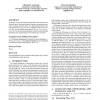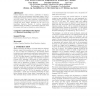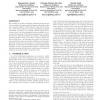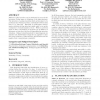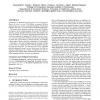113
click to vote
ATAL
2007
Springer
15 years 7 months ago
2007
Springer
This paper proposes the β-WoLF algorithm for multiagent reinforcement learning (MARL) in the stochastic games framework that uses an additional “advice” signal to inform agen...
133
click to vote
ATAL
2007
Springer
15 years 7 months ago
2007
Springer
Intelligent agents that are intended to work in dynamic environments must be able to gracefully handle unsuccessful tasks and plans. In addition, such agents should be able to mak...
101
click to vote
ATAL
2007
Springer
15 years 7 months ago
2007
Springer
We propose a new class of representations that can be used for modeling (and model checking) temporal, strategic and epistemic properties of agents and their teams. Our representa...
ATAL
2007
Springer
15 years 7 months ago
2007
Springer
ATAL
2007
Springer
15 years 7 months ago
2007
Springer
Criminal behaviour often involves a combination of physical, mental, social and environmental (multi-)agent aspects, such as neurological deviations, hormones, arousal, (non)empat...
140
click to vote
ATAL
2007
Springer
15 years 7 months ago
2007
Springer
We consider the problem of finding optimal strategies in infinite extensive form games with incomplete information that are repeatedly played. This problem is still open in lite...
ATAL
2007
Springer
15 years 7 months ago
2007
Springer
Failures in plan execution can be attributed to errors in the execution of plan steps or violations of the plan structure. The structure of a plan prescribes which actions have to...
119
click to vote
ATAL
2007
Springer
15 years 7 months ago
2007
Springer
In this work, we introduce a framework where defeasible argumentation is used for reasoning about beliefs, desires and intentions. A dialectical filtering process is introduced i...
ATAL
2007
Springer
15 years 7 months ago
2007
Springer
In this paper, we discuss the use of Targeted Trajectory Distribution Markov Decision Processes (TTD-MDPs)—a variant of MDPs in which the goal is to realize a specified distrib...
ATAL
2007
Springer
15 years 7 months ago
2007
Springer
Agents enacting business processes in large open environments need to adaptively accommodate exceptions. Work on multiagent approaches can flexibly model business processes. This...

